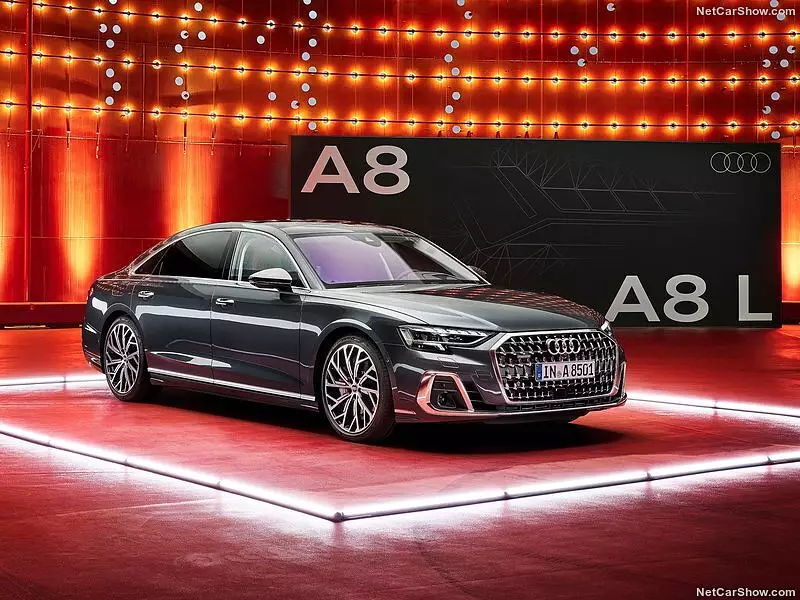Audi AG is a German automobile manufacturer that designs, engineers, produces, markets and distributes luxury vehicles. Audi is a subsidiary of the Volkswagen Group and has its headquarters in Ingolstadt, Bavaria, Germany. Audi-branded vehicles are produced in nine production facilities worldwide.
Audi was founded in 1910 as August Horch Automobilwerke GmbH by August Horch, an automobile engineer and entrepreneur. Horch had previously founded the Horch company in 1899, but was forced out in 1909 due to disagreements with the board of directors. After leaving Horch, he founded a new company under his own name, but was sued by his former partners for trademark infringement. As a result, he was forced to change the name of his new company to Audi, which is the Latin translation of his surname.
Audi quickly established itself as a leading manufacturer of luxury vehicles. In 1932, Audi merged with three other German automakers to form Auto Union AG. Auto Union produced a variety of vehicles, including passenger cars, commercial vehicles, and racing cars. Audi’s racing team achieved great success in the 1930s, winning the German Grand Prix championship in 1934 and 1936.
After World War II, Auto Union was dissolved and Audi was re-established as an independent company. In 1965, Audi was acquired by Volkswagen. Volkswagen invested heavily in Audi, and under Volkswagen’s ownership, Audi became a leading manufacturer of luxury vehicles.
Audi is known for its innovative technology and high-performance vehicles. Audi was one of the first automakers to introduce quattro all-wheel drive to its passenger cars. Audi has also been a pioneer in the development of fuel-efficient and environmentally friendly vehicles. In 2009, Audi introduced the Audi A8 Hybrid, the world’s first production hybrid luxury sedan.
Audi is also known for its luxurious and stylish vehicles. Audi’s interior designs are known for their quality materials and craftsmanship. Audi’s vehicles are also equipped with the latest technology and features.
Today, Audi is one of the leading manufacturers of luxury vehicles. Audi’s vehicles are sold in over 100 countries around the world. Audi is a popular brand among celebrities and business leaders. Audi’s vehicles are known for their status symbol and performance.
Here are some of Audi’s most popular models:
- Audi A3: A compact luxury sedan
- Audi A4: A midsize luxury sedan
- Audi A5: A midsize luxury coupe
- Audi A6: A full-size luxury sedan
- Audi A7: A full-size luxury sportback
- Audi A8: A full-size luxury flagship sedan
- Audi Q3: A subcompact luxury SUV
- Audi Q5: A compact luxury SUV
- Audi Q7: A midsize luxury SUV
- Audi Q8: A full-size luxury SUV
- Audi e-tron: A full-size luxury electric SUV
- Audi e-tron GT: A full-size luxury electric sports car
Audi is a brand that is constantly innovating and pushing the boundaries of what is possible in the automotive industry. Audi is committed to providing its customers with the best possible driving experience.
Success Story of Audi
Audi, the renowned German automobile manufacturer, has a rich history dating back to the early 20th century. This success story traces its journey from humble beginnings to becoming one of the most prestigious and influential brands in the automotive industry. With a focus on innovation, quality, and a commitment to excellence, Audi has set a standard that has made it a symbol of luxury and performance worldwide.
Early Years and Foundation
The Audi story began in 1909 when August Horch, a former engineer from Karl Benz’s company, founded a car company named after himself, “Horch.” His visionary approach and passion for automobiles soon led to the establishment of Horch & Cie. Motorwagenwerke AG in Zwickau, Germany. However, differences with the board of directors resulted in Horch leaving the company, seeking to create a new venture under his name.

But, there was a legal issue. August Horch could not use his own name for the new company, as it had already been trademarked. Undeterred, he decided to translate his last name, which means “listen” in German, to Latin, giving birth to the brand Audi. This event marked the beginning of the Audi journey.
The Roaring Twenties
The 1920s were a period of significant growth and technological innovation for Audi. The company introduced the Type K, one of the first German cars to feature left-hand drive, and the Type M, which boasted a six-cylinder engine. However, Audi truly made its mark with the Audi Type E, a revolutionary vehicle featuring a 2.6-liter engine with a supercharger, giving it the nickname “Imperator.” The Audi Type E was the first European car to combine a powerful engine with a lightweight body, delivering impressive performance and earning Audi a reputation for engineering excellence.

Challenges in the Mid-20th Century
As Audi continued to develop innovative cars, World War II interrupted the company’s progress. The aftermath of the war saw the division of Germany into East and West, resulting in a complex history for Audi. The company’s factories were located in East Germany, and the Soviet-controlled government expropriated the assets. This setback forced Audi to rebuild from scratch, with Horch and DKW becoming part of the Auto Union in the West.
During the post-war years, Audi faced financial challenges. The Auto Union combined the resources of these companies and decided to focus on producing more economical and compact vehicles, which led to the production of the famous DKW Schnellaster van, a popular vehicle in the 1950s. The company also introduced the Audi brand’s distinctive four-ring logo in 1952, symbolizing the unification of the four Auto Union brands – Audi, DKW, Horch, and Wanderer.
The Rebirth of Audi
In the 1960s, Audi underwent a significant transformation. The company introduced the Audi F103, a compact sedan that marked the revival of the Audi brand. This car was known for its robust engineering, innovative technology, and spacious interior. Audi’s reputation for quality and reliability began to take shape with the F103, laying the foundation for the brand’s future success.

The Quattro Revolution
Audi’s most defining moment came in 1980 with the introduction of the Audi Quattro. The Quattro was a groundbreaking innovation, featuring all-wheel drive technology in a passenger car for the first time. This innovation not only transformed Audi but the entire automotive industry. The Quattro’s success in rallying and its impressive performance capabilities on the road solidified Audi’s reputation for producing high-performance and technologically advanced vehicles.
The Quattro technology, with its innovative four-wheel-drive system, allowed Audi to dominate the rally circuits, leading to four World Rally Championships in the early 1980s. The Quattro’s success not only brought recognition to Audi but also highlighted the potential of all-wheel-drive systems in passenger cars.
Audi’s Technological Advancements
Throughout the 1990s and into the 21st century, Audi continued to push the envelope with technological advancements. The brand became known for its pioneering work in aerodynamics, lightweight materials, and innovative engine technologies. One notable innovation was the introduction of the TDI (Turbocharged Direct Injection) diesel engines, which combined power and fuel efficiency, challenging the stereotype that diesel engines were only suitable for commercial vehicles.
In 1994, Audi unveiled the A8, a luxury sedan that featured an aluminum body, making it significantly lighter and more fuel-efficient than competitors. Audi’s commitment to innovation and cutting-edge technology helped establish the company as a leader in the automotive industry.

The Modern Era: Audi’s Expanding Portfolio
The 21st century saw Audi expand its product lineup to include a wide range of vehicles, from compact sedans to high-performance sports cars and SUVs. The Audi A3, A4, A6, and A8 have become synonymous with luxury and refinement, while the Audi TT and R8 have captured the hearts of sports car enthusiasts worldwide.
Audi’s “S” and “RS” performance models cater to those seeking exhilarating driving experiences. The Audi S4, S6, and RS6 are celebrated for their combination of practicality and impressive performance, setting new benchmarks in their respective segments.
In the SUV category, Audi introduced the Q-series, including the Q3, Q5, Q7, and Q8, reflecting the increasing popularity of SUVs. These models blend Audi’s hallmark luxury with versatility and capability, appealing to a broad range of consumers.
Audi’s electric ambitions became evident with the launch of the Audi e-tron, an all-electric SUV, and later the Audi e-tron GT, a high-performance electric sports car. The company is committed to sustainability and reducing its environmental footprint, reflecting the evolving automotive landscape and consumer preferences.
Audi’s Global Reach
Audi’s success story is not confined to Germany. The company expanded its reach globally, establishing a strong presence in key markets, including the United States, China, and India. Audi’s reputation for quality, luxury, and performance has resonated with a diverse international audience.
China, in particular, has become a crucial market for Audi. The demand for luxury vehicles in China has grown significantly, and Audi has adapted to local preferences by offering long-wheelbase models, which are popular among Chinese consumers. This approach has made Audi one of the top luxury car brands in China.
Challenges and Triumphs
Audi has faced its share of challenges along the way. Intense competition within the luxury automobile sector from brands like BMW and Mercedes-Benz has required Audi to continually innovate and differentiate itself. Quality control issues, such as those experienced in the early 2010s, led to a significant product recall, reinforcing the importance of maintaining the brand’s reputation for quality.
In addition to competition and quality concerns, Audi has navigated economic downturns, changing emissions regulations, and the need to embrace electric and autonomous technologies. The company’s ability to adapt and innovate has been critical to its continued success.
Sustainability and the Future
In recent years, Audi has focused on sustainability and environmental responsibility. The company has committed to reducing its carbon footprint, both in its manufacturing processes and in the vehicles it produces. Audi’s electric vehicle lineup is expanding, with the goal of achieving carbon-neutral production by 2025.
Audi is also investing heavily in autonomous driving technology. The brand aims to integrate self-driving features into its vehicles, providing enhanced safety and convenience to its customers. These efforts reflect Audi’s dedication to staying at the forefront of automotive technology.
Success Factors of Audi
Audi, a luxury vehicle brand under the Volkswagen Group, has been synonymous with excellence, innovation, and style. With a rich history spanning over a century, Audi has managed to carve out a unique niche for itself in the highly competitive automotive industry. As we delve into the success factors behind Audi’s renowned reputation, we will explore the key elements that have contributed to its triumph.
1. Innovative Technology and Design: Audi’s commitment to innovation is evident in its cutting-edge technology and sleek designs. From its Quattro all-wheel drive system to its advanced infotainment systems, Audi has consistently pushed the boundaries of what is possible in the automotive world. Its design language, characterized by clean lines, sharp angles, and sweeping curves, has become instantly recognizable and iconic. Audi’s dedication to innovation has not only enhanced the driving experience but also helped create a loyal customer base.
2. Performance and Handling: Audi’s focus on performance and handling has been a cornerstone of its success. Its vehicles are engineered to deliver exceptional power, agility, and control, making them a favorite among driving enthusiasts. The brand’s racing heritage, particularly in events like the 24 Hours of Le Mans, has translated into impressive road cars that offer an exhilarating driving experience. Audi’s slogan “Vorsprung durch Technik” (Advancement through Technology) encapsulates its commitment to delivering high-performance vehicles that thrill drivers and inspire confidence.
3. Luxury and Comfort: Audi’s attention to detail in crafting luxurious interiors has played a significant role in its success. Its cabins are designed to provide unparalleled comfort, ergonomics, and premium materials, creating a sense of exclusivity and refinement. Features such as heated seats, ambient lighting, and advanced climate control systems have become hallmarks of Audi’s commitment to passenger satisfaction. This emphasis on luxury and comfort has made Audi a top choice for discerning buyers seeking a superior driving experience.
4. Brand Identity and Marketing Strategy: Audi’s strong brand identity has been carefully cultivated over the years, with a consistent message that resonates with its target audience. The brand’s marketing strategy has effectively communicated its values of innovation, performance, and luxury, contributing to its widespread appeal. Memorable advertising campaigns, sponsorships, and collaborations with high-profile events like the FIFA World Cup and the Academy Awards have further reinforced Audi’s position as a prestigious brand.
5. Customer Service and After-Sales Support: Audi’s dedication to providing excellent customer service and after-sales support has fostered a strong bond between the brand and its clientele. Its comprehensive warranty programs, personalized services, and extensive dealership networks ensure that owners enjoy peace of mind and seamless maintenance experiences. By prioritizing customer satisfaction, Audi has built a loyal following and encouraged repeat business.
6. Collaborations and Partnerships: Audi has strategically partnered with other brands, startups, and research institutions to leverage their expertise and stay at the forefront of technological advancements. These collaborations have led to breakthroughs in areas like autonomous driving, electrification, and digitalization, allowing Audi to integrate cutting-edge features into its vehicles. Such partnerships demonstrate Audi’s willingness to engage with the broader community and invest in the future of mobility.
7. Continuous Improvement and Adaptation: Audi’s success can be attributed, in part, to its ability to adapt to changing consumer preferences and market trends. The brand has continuously updated its model lineup, introducing new variants and trim levels to cater to diverse tastes and needs. For instance, Audi has expanded its SUV portfolio with models like the Q3, Q5, and Q7, which have proven popular among families and those seeking a versatile, luxury vehicle. Additionally, the brand has entered the electric vehicle market with models like the e-tron SUV and e-tron Sportback, appealing to environmentally conscious consumers who desire a premium EV experience.
8. Strong Dealership Network: Audi boasts a vast network of dealerships worldwide, offering convenient access to sales and service for customers. Its dealerships are designed to provide an immersive brand experience, showcasing the latest models and technologies. Trained sales representatives and skilled technicians ensure that customers receive professional advice and quality maintenance, supporting Audi’s reputation for excellent customer service.
9. Racing Heritage and Motorsport Success: Audi’s involvement in motorsport has contributed significantly to its prestige and desirability. The brand’s racing heritage dates back to the early 20th century, with notable achievements in events like the 24 Hours of Le Mans and Formula One. Audi’s dominance in endurance racing has translated into production cars that embody the spirit of competition and speed, appealing to enthusiasts who value performance and precision engineering.
10. Advanced Safety Features: Audi has consistently implemented cutting-edge safety technologies in its vehicles, placing it among the leaders in automotive safety. Features like adaptive cruise control, lane departure warning, and automatic emergency braking have become standard across many Audi models. This emphasis on safety provides peace of mind for drivers and passengers, further enhancing the overall ownership experience.
11. User-Friendly Infotainment Systems: Audi’s MMI (Multi Media Interface) infotainment system has undergone significant improvements over the years, becoming increasingly user-friendly and feature-rich. The system integrates seamlessly with smartphones, navigation, and audio functions, providing drivers with intuitive controls and minimizing distractions while driving.
12. Attention to Detail in Craftsmanship: Audi’s commitment to quality and attention to detail are reflected in every aspect of its vehicles, from the fit and finish of interior components to the precise engineering of mechanical parts. The brand’s obsession with details has resulted in a level of craftsmanship that sets it apart from competitors, justifying its premium price point and pleasing even the most discerning customers.
13. Wide Range of Model Choices: Audi offers a diverse range of models, catering to various segments and preferences. Whether you seek a compact hatchback like the A3, a luxury sedan like the A6, or a high-performance sports car like the R8, Audi has something to meet your needs. This variety ensures that the brand remains relevant and appealing to a broad spectrum of buyers.
By examining these factors, it becomes clear why Audi has established itself as a respected luxury car brand, known for blending style, performance, and technology in a way that resonates with affluent and discerning buyers.
Also Read: Marketing Strategies, Marketing Mix and STP of Audi
To read more content like this, subscribe to our newsletter




